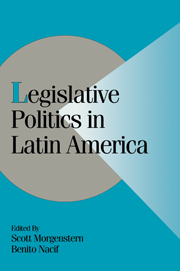Book contents
- Frontmatter
- Contents
- Tables and Figures
- Contributors
- Preface and Acknowledgments
- Party Names and Other Acronyms and Abbreviations
- 1 TOWARDS A MODEL OF LATIN AMERICAN LEGISLATURES
- Part I Executive–Legislative Relations
- Part II Political Parties and Legislative Structure
- Part III Legislatures and the Policy Process
- Part IV Conclusions
- 14 EXPLAINING LEGISLATIVE POLITICS IN LATIN AMERICA
- 15 EPILOGUE: LATIN AMERICA'S REACTIVE ASSEMBLIES AND PROACTIVE PRESIDENTS
- References
- Author Index
- General Index
15 - EPILOGUE: LATIN AMERICA'S REACTIVE ASSEMBLIES AND PROACTIVE PRESIDENTS
Published online by Cambridge University Press: 14 January 2010
- Frontmatter
- Contents
- Tables and Figures
- Contributors
- Preface and Acknowledgments
- Party Names and Other Acronyms and Abbreviations
- 1 TOWARDS A MODEL OF LATIN AMERICAN LEGISLATURES
- Part I Executive–Legislative Relations
- Part II Political Parties and Legislative Structure
- Part III Legislatures and the Policy Process
- Part IV Conclusions
- 14 EXPLAINING LEGISLATIVE POLITICS IN LATIN AMERICA
- 15 EPILOGUE: LATIN AMERICA'S REACTIVE ASSEMBLIES AND PROACTIVE PRESIDENTS
- References
- Author Index
- General Index
Summary
The chapters in this book have shown that, although the Latin American legislatures are only reactive, they are not dysfunctional. Since they are reactive bodies, it is important to consider the force to which they are reacting, namely, the president. It is clear that at times this opposing force has dominated Latin American politics, but frequently the presidents do make policy concessions as a part of their overall strategy for getting their way. Even if one continues to view the president as the central actor in the civilian–political universe, his anticipation of a (possible) legislative veto should in theory condition most of his actions. The optimal strategy for even the most autocratically minded president is not to pretend that the legislature does not exist and propose whatever policies he likes, then react spasmodically when the legislature refuses its assent. Rather, the “cheapest” strategy will often be to cobble together as many legislative votes as possible purely on the merits, conserving other assets (such as pork and patronage) for securing any necessary marginal votes.
Our goal is to theorize within a rational choice framework about how Latin American legislatures operate when they are in the policybargaining mode, as opposed to the supine, venal, or horrified-onlooker modes. Our discussion revolves around three themes. First, the venerable “rule of anticipated reactions” makes even primarily reactive institutions, such as Latin American legislatures, relevant. Second, to the extent that Latin American presidents are continually anticipating legislative reactions, their strategies will vary depending on the type of legislature that they face.
- Type
- Chapter
- Information
- Legislative Politics in Latin America , pp. 446 - 468Publisher: Cambridge University PressPrint publication year: 2002
- 39
- Cited by



